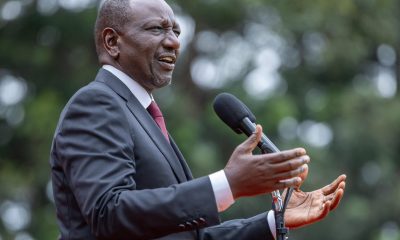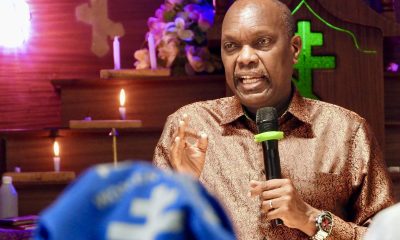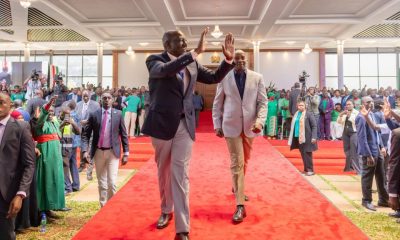Politics
Ruto at 1,000 Days: A Presidency Under Scrutiny
When Ruto ascended to power in September 2022, he carried the hopes of millions who believed his “bottom-up” economic model would transform their lives.

As President William Ruto marks his 1,000th day in office today, Kenya finds itself at a crossroads—caught between the ambitious promises of a “hustler” president and the harsh realities of governance that have left many questioning whether the nation’s trajectory matches the lofty rhetoric.
The Promise vs. Reality Divide
When Ruto ascended to power in September 2022, he carried the hopes of millions who believed his “bottom-up” economic model would transform their lives.
His campaign narrative was compelling: a champion of the poor taking on the establishment, promising to create jobs for unemployed youth and prioritize low-income earners.
Yet 1,000 days later, the president who once promised to eliminate corruption “because there will be no money to steal” finds himself nicknamed “Zakayo” by critics—a reference to the biblical tax collector—as his administration has imposed a series of tax measures that have deepened the financial burden on ordinary Kenyans.
Economic Contradictions
The numbers tell a complex story. While Ruto boasts of a 5% average annual growth rate that outperforms global and regional averages, economist XN Iraki offers a sobering counter-narrative: “The economy has grown, but decelerated from 5.7 to 4.7 percent from 2023 to 2024. Who has felt that growth? Not the common man with joblessness and anxiety.”
The contradiction is stark. Inflation has dropped from 9.6% in October 2022 to 3.8% in May 2025, and the Kenya shilling has stabilized after depreciating to alarming lows.
Yet taxi drivers, mechanics, and small-scale traders—the very “hustlers” Ruto claimed to represent—tell a different story of economic hardship.
The Housing Deficit
Perhaps nowhere is the gap between promise and delivery more evident than in housing. The Kenya Kwanza manifesto promised 250,000 housing units annually, later revised to 200,000.
After 1,000 days, only 11,000 units are completed, with 148,165 under construction—a massive shortfall that should have seen at least 500,000 units completed by now.
The introduction of the 1.5% Housing Levy has further strained workers’ take-home pay, while the promised job creation in construction has not materialized.
Ironically, the Kenya National Bureau of Statistics reports the construction sector declined by 0.7% in 2024, contradicting claims of job creation.
The Hustler Fund Struggles
The flagship Hustler Fund, launched with fanfare in November 2022, exemplifies the administration’s implementation challenges.
Initially allocated Sh12 billion, funding has dwindled to just Sh1 billion in the current financial year. With Sh6 billion in bad loans from 10 million borrowers, the fund that was meant to empower small businesses has become a cautionary tale about policy execution.
Healthcare Chaos
The transition from the National Health Insurance Fund to the Social Health Insurance Fund has been particularly problematic.
Despite increased contributions—a worker earning Sh100,000 now pays Sh2,700 compared to the previous flat rate of Sh1,700—service delivery has deteriorated.
Nine out of ten health facilities struggle with operational costs due to delayed payments, while 8,571 medics remain on the streets as national and county governments dispute their employment.
The Church Falls Out of Love
Perhaps most symbolically damaging has been the deterioration of Ruto’s relationship with religious institutions.
Once his most ardent supporters, several churches now reject his donations, with the Catholic Archdiocese of Nairobi and Anglican Church of Kenya declining contributions worth millions.
The shift began with the Shakahola cult tragedy and deepened during the June 2024 anti-tax protests. Religious leaders who once called Ruto “God-chosen” now openly question his leadership, with some barring politicians from their pulpits altogether.
Even in sports, a sector close to Ruto’s heart, promises remain largely unmet.
The Kenya Kwanza manifesto’s six-point sports development plan has seen minimal implementation. The promised sporting heroes’ benevolent fund doesn’t exist, while the delayed completion of Kasarani and Nyayo stadiums forced the national football team to play home matches abroad.
The expensive Sh44 billion Talanta Stadium project, while impressive in scope, raises questions about priorities when basic sporting infrastructure remains inadequate across the country.
The Corruption Paradox
The administration that promised zero tolerance for corruption has lost Sh650 million through corrupt deals in its first financial year alone. Of 109 reported graft cases, only 34 civil servants were charged, resulting in a mere four convictions—a pattern that undermines the president’s anti-corruption rhetoric.
Youth Uprising and Political Awakening
The June 2024 anti-tax protests marked a turning point, revealing the depth of public dissatisfaction with Ruto’s policies.
The youth-led demonstrations, which forced the president to withdraw the Finance Bill 2024, demonstrated that the very generation he claimed to champion had become his fiercest critics.
As Ruto enters the second half of his first term, the challenges are immense.
His approval ratings have plummeted, former allies have become critics, and the church—once his strongest institutional support—has distanced itself from his administration.
The president maintains that his policies will eventually bear fruit, pointing to infrastructure projects, agricultural reforms, and digital transformation initiatives.
Yet the gap between his optimistic assessments and the lived experiences of ordinary Kenyans continues to widen.
The Verdict So Far
At 1,000 days, Ruto’s presidency presents a study in contrasts.
Macroeconomic indicators show some improvement, but the benefits haven’t trickled down to the masses. Grand infrastructure projects progress, but basic services remain inadequate.
International relations flourish, but domestic legitimacy erodes.
The president who campaigned as a transformational leader finds himself defending incremental progress while his critics argue that the transformation has been in the wrong direction.
Whether the remaining 847 days of his first term will validate his promises or confirm his critics’ assessments remains the defining question of his presidency.
As Kenya observes this milestone on International Archives Day, the records of Ruto’s first 1,000 days provide a sobering reminder that in politics, as in archives, the truth eventually emerges—and it’s often more complex than the narratives those in power prefer to tell.
Kenya Insights allows guest blogging, if you want to be published on Kenya’s most authoritative and accurate blog, have an expose, news TIPS, story angles, human interest stories, drop us an email on [email protected] or via Telegram
-

 Grapevine1 week ago
Grapevine1 week agoAlleged Male Lover Claims His Life Is in Danger, Leaks Screenshots and Private Videos Linking SportPesa CEO Ronald Karauri
-

 Lifestyle2 weeks ago
Lifestyle2 weeks agoThe General’s Fall: From Barracks To Bankruptcy As Illness Ravages Karangi’s Memory And Empire
-

 Grapevine5 days ago
Grapevine5 days agoRussian Man’s Secret Sex Recordings Ignite Fury as Questions Mount Over Consent and Easy Pick-Ups in Nairobi
-

 Investigations2 weeks ago
Investigations2 weeks agoEpstein Files: Sultan bin Sulayem Bragged on His Closeness to President Uhuru Then His Firm DP World Controversially Won Port Construction in Kenya, Tanzania
-

 Investigations2 days ago
Investigations2 days agoMulti-Million Dollar Fraud: Three Kenyans Face US Extradition in Massive Cybercrime Conspiracy
-

 Investigations2 weeks ago
Investigations2 weeks agoEpstein’s Girlfriend Ghislaine Maxwell Frequently Visited Kenya As Files Reveal Local Secret Links With The Underage Sex Trafficking Ring
-

 News2 weeks ago
News2 weeks agoState Agency Exposes Five Top Names Linked To Poor Building Approvals In Nairobi, Recommends Dismissal After City Hall Probe
-

 Business1 week ago
Business1 week agoM-Gas Pursues Carbon Credit Billions as Koko Networks Wreckage Exposes Market’s Dark Underbelly



























